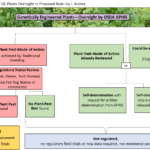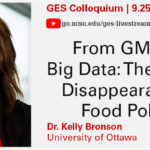
Blog: Key Ecological Perspectives: Tracing the Evolution of GMO Oversight with Dr. David Andow
Nick Loschin | Dr. David Andow provided his insights and expertise on ecological and evolutionary perspectives related to genetic engineering through key events from the 1980s to the early 2000s...
Biotechnology Oversight Gets an Early Make-Over by Trump’s White House and USDA: Part 2 – The USDA-APHIS Rule
Jennifer Kuzma, July 2, 2019 | USDA-APHIS has proposed an oversight process for GE crops that appears to be a significant departure from the current one. This article discusses the features of the proposed new rule, along with its strengths and weaknesses and my recommendations for how it should be amended. ...
Biotechnology Oversight Gets an Early Make-Over by Trump’s White House and USDA: Part 1—The Executive Order
Jennifer Kuzma, June 18, 2019 | Last week, the Trump administration set the tone for its oversight of agricultural biotechnology (ag biotech) through two major actions: 1) Signing the Modernizing the Regulatory Framework for Agricultural Biotechnology Products Executive Order; and 2) Proposing a draft rule on the Movement of Certain Genetically Engineered Organisms (GEOs), changing how USDA reviews GE plants....
GES Colloquium | Teshanee Williams – Using Cognitive Story Structures to Examine Influence in the Regulatory Review Process
GES Colloquium, 3/19/18 - Teshanee Williams - Using Cognitive Story Structures to Examine Influence in the Regulatory Review Process | Genetically engineered salmon have been approved for human consumption in the United States (US) and Canada, but it has only been released for sale in Canada. In the US, opposition to the approval caused regulatory agencies to update the voluntary labeling guidance, requiring food manufacturers to label foods disclosing information about bioengineered foods and bioengineered food ingredients. Still, some scholars have emphasized the need for risk management to be inclusive of narratives beyond that of the elitist risk assessment and reduction approach....
Kelly Bronson – ‘From GMOs to big data: the curious disappearance of food politics’
Kelly Bronson, uOttawa - Abstract: Many scholars have made sense of opposition to genetically engineered (GE) organisms as contextual: these tools are judged in their historical linkages with poisonous agricultural chemicals (like dichlorodiphenyltrichloroethane/DDT), and with the corporations responsible for the production of such chemicals who now sell GE seed systems....
Justin Biddle – “Antiscience Zealotry?” Values, Epistemic Risk, and the GMO Debate
Justin B. Biddle is an Associate Professor in the School of Public Policy at the Georgia Institute of Technology. His research interests are interdisciplinary in nature, drawing on fields such as philosophy of science, technology, and medicine; bioethics; food studies; ethics of emerging technologies, and science and technology policy. Conceptually, his research explores the relationships between three sets of issues: (1) the role of values in science, technology, and medicine; (2) the epistemic implications of the social organization of research, and (3) ethics and policy. He has explored these relationships primarily in the areas of biomedical research and agricultural biotechnology. ...
EU ruling on gene-edited plants and GMOs is more status quo than disruptive
Prior to the recent European Union ruling regarding gene-edited plants, opponents stoked fears that these new gene editing techniques were a loop-hole for big agricultural companies to release their untested, dangerous GMOs onto an unsuspecting...Continue reading "EU ruling on gene-edited plants and GMOs is more status quo than disruptive"

Kuzma quoted on ecological impacts and regulation of GE products
To critics, the case laid bare glaring weaknesses in the country’s oversight of genetically engineered, or GE, crops. While biotechnology’s defenders say the process is already overly rigorous, others have long argued that regulations, which haven’t changed significantly since 1987, don’t do enough to protect agriculture and the environment. Neither the USDA nor any government agency must weigh the full social, economic and ecological impacts of GE products, says Jennifer Kuzma, co-director of the Genetic Engineering and Society Center at North Carolina State University. “There’s really no place that’s looking at this broadly from a risk-benefit perspective.”...Continue reading "Kuzma quoted on ecological impacts and regulation of GE products"

Kuzma in Scientific American article: Weeds Are Winning in the War against Herbicide Resistance
Herbicides are under evolutionary threat. Can modern agriculture find a new way to fight back? Excerpt: For farmers, protecting fields from pests and plagues is a constant battle fought on multiple fronts. Many insects have...
Jennifer Kuzma in the WSJ: Referring to gene-editing as “breeding” seems disingenuous
Is This Tomato Engineered? Inside the Coming Battle Over Gene-Edited Food The agriculture industry, which hopes Crispr technology will transform the business, faces opponents who call it ‘GMO 2.0’ By Jacob Bunge and Amy Dockser...
Jason Delborne appointed to National Academies Forest Biotech Study Committee
Dr. Jason Delborne has been appointed to the National Academies of Sciences provisional committee on The Potential for Biotechnology to Address Forest Health, or Forest Biotech Study. The study will be looking at the potential uses of biotechnology to mitigate threats to forest tree health, identify ecological, ethical, and societal implications of using this technology in forests, and develop an agenda to address knowledge gaps in its application. ...Continue reading "Jason Delborne appointed to National Academies Forest Biotech Study Committee"

2012-13 Colloquia
Join the Conversation! Colloquium is held Tuesdays at 12pm in the 1911 Building, room 129. Contact Jason Delborne at jadelbor@ncsu.edu for more information....
2013-14 Colloquia
Join the Conversation! Colloquium is held Tuesdays at 12pm in the 1911 Building, room 129. Contact Jason Delborne at jadelbor@ncsu.edu for more information....
